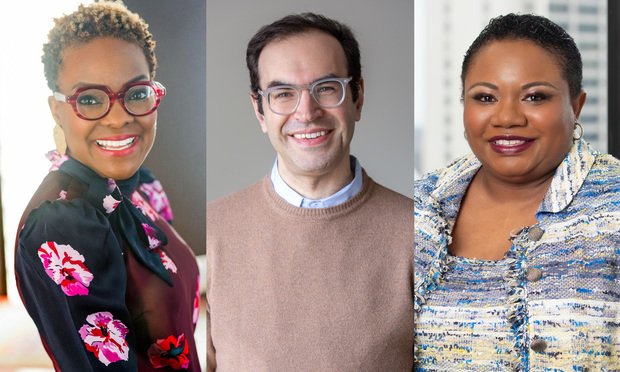
Marc Gilman and Cheree Johnson had to rely on outside counsel and their peer groups to learn about different legal fields when they took up the general counsel role. Areas such as employment, securities and corporate governance did not come naturally to them.
Marc Gilman and Cheree Johnson had to rely on outside counsel and their peer groups to learn about different legal fields when they took up the general counsel role. Areas such as employment, securities and corporate governance did not come naturally to them.
Cheree Johnson, who became general counsel in January at W.R. Grace & Co. in Columbia, Maryland, had an unusual trajectory to the top legal job.
Johnson worked as an engineer at 3M before attending law school, giving her an “in” at the Minnesota-based company. She did not take on a full-time law firm job, beyond a stint as a summer associate. When she graduated from the University of Minnesota Law School, she headed right away to the in-house department at 3M, overseeing intellectual property.
Johnson was always ambitious. She once dreamed of serving as a justice on the United States Supreme Court. However, going in-house changed those goals. As an intellectual property attorney, her eyes were set on becoming chief IP counsel, but not much beyond that, at first. In 2009, she left 3M to become chief IP counsel at the Kraft Heinz Co. However, she set a new goal shortly after beginning her work there.
“The prospect of becoming general counsel became crystalized at Heinz. I started off as chief IP counsel, and then I was asked to start the European legal team in Amsterdam,” Johnson said.
Knowing when someone is ready to lead a legal department is not a one-size-fits-all answer, said Sonya Olds Som, a recruiter and partner at Heidrick & Struggles in Chicago. However, there are general signposts to recognize to see if a deputy general counsel or associate general counsel has what it takes to lead a corporate legal department. First, she said, she looks to see if those looking to take the next step in their career have held a leadership position before.
“Smart organizations are being very intentional about giving up-and-coming folks the chance to get ready to become general counsel,” Som said.
While some organizations actively help in-house attorneys climb to the top, it is ultimately up to the individual to decide when he or she should take the leap to aim to become general counsel.
Marc Gilman, general counsel and vice president of compliance at Theta Lake in New York, recalled that while working as the global head of information management law at Morgan Stanley, he was given the opportunity to learn where finance, technology and the law intersect. However, he was not interested in becoming a general counsel until the end of a seven-year stint at the firm. It was then that he wanted to move beyond his niche role in the legal department.
Any general counsel has to acknowledge that the role is a learning process, Gilman explained. He wanted to put himself in a position to learn more—specifically, about how technology startups work.
“It was more of the acknowledgment of wanting that broader experience, rather than thinking to myself, ‘I know everything that I need to know to become a GC.’ That is not the most critically thought-through path,” Gilman explained.
Expanding Hard and Soft Skills on the Job
In speaking with others before making the jump to become a general counsel, Johnson said she had to expand her expertise in different areas of the law, rather than developing the soft skills that are required of general counsel.
“I’ve always been told I was a business lawyer. I’ve taken every leadership course there is, and I am proud of my EQ [emotional quotient, or emotional control]. However, I needed to broaden my practice areas to move away from being seen as an IP expert,” she explained.
She explained that as an IP expert, she was told that the highest goal she could hope to achieve in-house was that of a chief IP counsel. Therefore, she needed to broaden her knowledge of different practice areas. While at Heinz, she said she met with outside counsel regularly and took crash courses in areas such as corporate governance, employment law and securities.
“We spent a day where I learned the basic principles, asked questions, and read up on the latest developments. At that point, I was ready to dive into that practice with a little knowledge and a lot of confidence,” Johnson explained.
Gilman explained he learned a lot of the soft skills required of a general counsel while at Morgan Stanley. Learning how to deliver legal advice to the business, and to people not so familiar with the law, was a good way to learn those soft skills.
When Gilman first became the general counsel of Theta Lake, there were areas of the law that were unfamiliar to him. As Johnson did, he took a crash course in areas such as employment law. He largely relied on his peer group of other general counsel to keep him informed on emerging areas of the law and areas that were new to him. In addition to leveraging outside counsel, he utilized resources at Fordham University School of Law where he also serves as an adjunct professor.
“Conducting research and leveraging a variety of resources to learn about new areas of the law is a key part of being an efficient and effective GC,” Gilman said.
Goals Going Forward
Being a general counsel is a continuous learning experience. For many career in-house attorneys, it will be the peak of their career. Both Johnson and Gilman said continuing to learn how to be a successful, productive general counsel is what they are focused on now.
“I want to continue to learn how to be a really effective general counsel,” Johnson said.
Johnson mentioned that she would also like to use her skills as a general counsel to join a board of directors at a public company one day.
Gilman’s goal is to continue to learn about the business and further understand how startup companies, such as Theta Lake, operate.
“Part of joining Theta Lake was a desire to learn more about how start-ups function. Whether that’s in the legal realm, or how product development works, or how sales teams are set up and can be successful,” Gilman said. “Going outside of my comfort zone and learning more about business operations generally … Those are the types of things I’m focused on now, and in the future. ”
This article first appeared on Law on April 12th 2021.
Access the original article here!










